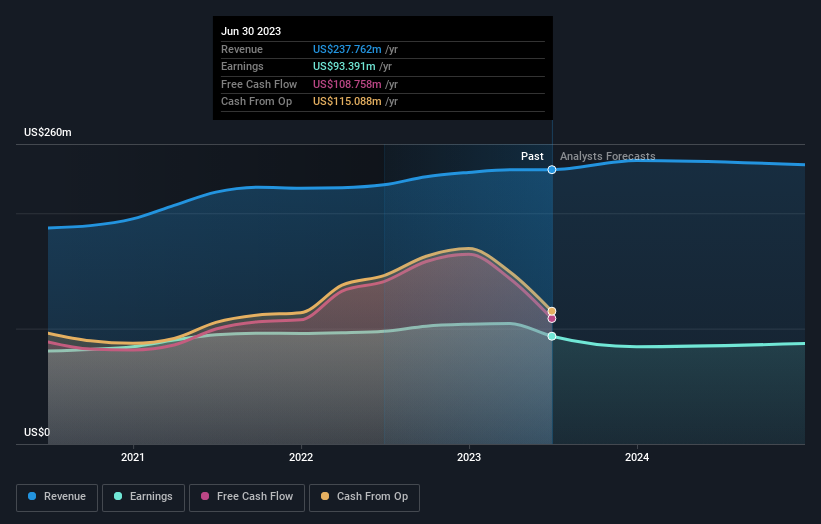Institutional owners may take dramatic actions as Lakeland Financial Corporation's (NASDAQ:LKFN) recent 4.4% drop adds to one-year losses
Key Insights
Institutions' substantial holdings in Lakeland Financial implies that they have significant influence over the company's share price
The top 11 shareholders own 52% of the company
To get a sense of who is truly in control of Lakeland Financial Corporation (NASDAQ:LKFN), it is important to understand the ownership structure of the business. We can see that institutions own the lion's share in the company with 81% ownership. Put another way, the group faces the maximum upside potential (or downside risk).
As a result, institutional investors endured the highest losses last week after market cap fell by US$60m. The recent loss, which adds to a one-year loss of 33% for stockholders, may not sit well with this group of investors. Institutions or "liquidity providers" control large sums of money and therefore, these types of investors usually have a lot of influence over stock price movements. As a result, if the downtrend continues, institutions may face pressures to sell Lakeland Financial, which might have negative implications on individual investors.
Let's take a closer look to see what the different types of shareholders can tell us about Lakeland Financial.
View our latest analysis for Lakeland Financial
What Does The Institutional Ownership Tell Us About Lakeland Financial?
Institutional investors commonly compare their own returns to the returns of a commonly followed index. So they generally do consider buying larger companies that are included in the relevant benchmark index.
As you can see, institutional investors have a fair amount of stake in Lakeland Financial. This implies the analysts working for those institutions have looked at the stock and they like it. But just like anyone else, they could be wrong. If multiple institutions change their view on a stock at the same time, you could see the share price drop fast. It's therefore worth looking at Lakeland Financial's earnings history below. Of course, the future is what really matters.
Since institutional investors own more than half the issued stock, the board will likely have to pay attention to their preferences. We note that hedge funds don't have a meaningful investment in Lakeland Financial. Our data shows that BlackRock, Inc. is the largest shareholder with 14% of shares outstanding. With 7.1% and 5.0% of the shares outstanding respectively, The Vanguard Group, Inc. and Neuberger Berman Investment Advisers LLC are the second and third largest shareholders. Additionally, the company's CEO David Findlay directly holds 0.9% of the total shares outstanding.
A closer look at our ownership figures suggests that the top 11 shareholders have a combined ownership of 52% implying that no single shareholder has a majority.
Researching institutional ownership is a good way to gauge and filter a stock's expected performance. The same can be achieved by studying analyst sentiments. Quite a few analysts cover the stock, so you could look into forecast growth quite easily.
Insider Ownership Of Lakeland Financial
While the precise definition of an insider can be subjective, almost everyone considers board members to be insiders. Management ultimately answers to the board. However, it is not uncommon for managers to be executive board members, especially if they are a founder or the CEO.
Insider ownership is positive when it signals leadership are thinking like the true owners of the company. However, high insider ownership can also give immense power to a small group within the company. This can be negative in some circumstances.
Shareholders would probably be interested to learn that insiders own shares in Lakeland Financial Corporation. The insiders have a meaningful stake worth US$45m. Most would see this as a real positive. Most would say this shows alignment of interests between shareholders and the board. Still, it might be worth checking if those insiders have been selling.
General Public Ownership
With a 15% ownership, the general public, mostly comprising of individual investors, have some degree of sway over Lakeland Financial. While this size of ownership may not be enough to sway a policy decision in their favour, they can still make a collective impact on company policies.
Next Steps:
It's always worth thinking about the different groups who own shares in a company. But to understand Lakeland Financial better, we need to consider many other factors. Case in point: We've spotted 1 warning sign for Lakeland Financial you should be aware of.
But ultimately it is the future, not the past, that will determine how well the owners of this business will do. Therefore we think it advisable to take a look at this free report showing whether analysts are predicting a brighter future.
NB: Figures in this article are calculated using data from the last twelve months, which refer to the 12-month period ending on the last date of the month the financial statement is dated. This may not be consistent with full year annual report figures.
Have feedback on this article? Concerned about the content? Get in touch with us directly. Alternatively, email editorial-team (at) simplywallst.com.
This article by Simply Wall St is general in nature. We provide commentary based on historical data and analyst forecasts only using an unbiased methodology and our articles are not intended to be financial advice. It does not constitute a recommendation to buy or sell any stock, and does not take account of your objectives, or your financial situation. We aim to bring you long-term focused analysis driven by fundamental data. Note that our analysis may not factor in the latest price-sensitive company announcements or qualitative material. Simply Wall St has no position in any stocks mentioned.


